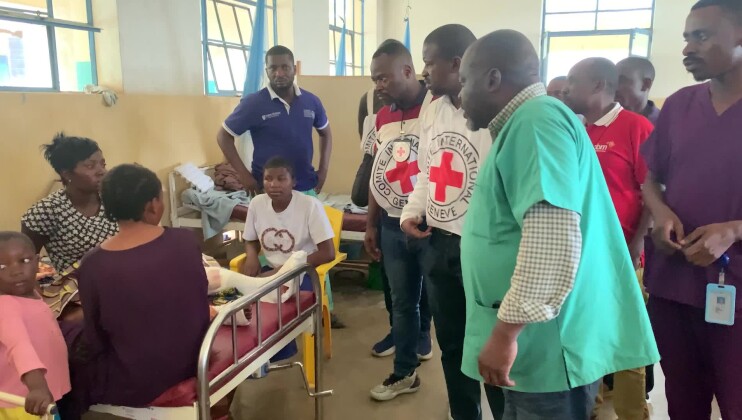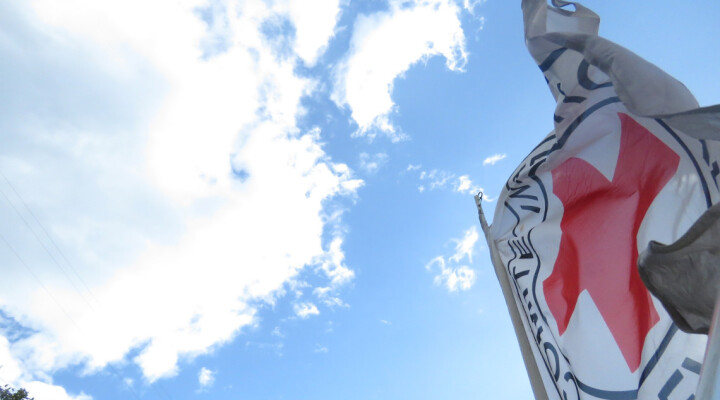Nigeria: Widespread flooding causes massive destruction; millions in need of urgent aid
Widespread flooding in Nigeria has damaged homes, infrastructure, displaced millions of people and wiped-out large swathes of farmland, leaving communities struggling to salvage this year’s harvest.
“It is a disaster. Really it is a disaster because all my effort is in my farm,” said Boyomoso Eli, a farmer in Wuro Dadi, a community on the banks of the Benue River in Adamawa state, an area still recovering from the communal violence of 2019. “It affected me much because all the resources I have I put it on my farm thinking that I will harvest many things that will help me in life, but the flood went away with everything I have invested in.”
Seasonal rains have been pouring relentlessly since June, causing severe floods, which have affected 2.5 million people and left more than 500 dead, according to Nigeria’s National Emergency Management Agency (NEMA). Millions of people need lifesaving aid, including shelter, water, sanitation, food and emergency healthcare as waterborne diseases such as cholera spread.
“With more than 440, 000 hectares of land already impacted by this flood, the magnitude of its effect on food security can be better imagined,” said Benson Agbro, head of the Nigerian Red Cross Society’s disaster response.
According to authorities, nearly 20 million people were projected to be facing acute food insecurity in Nigeria. Crop losses and lower yields caused by the flooding are likely to worsen shortages and push food prices up. Food shortages are most acute in Nigeria’s north east states, which are affected by armed conflict and hit by flooding.
The Nigerian Red Cross is responding to the flooding by evacuating affected people to safer ground and raising awareness on water and sanitation and hygiene practices to ward off waterborne disease. According to the Nigerian Centre for Disease Control, there were almost 11,000 cholera cases and 256 deaths nationwide at the beginning of October.
“We have also launched an appeal through the IFRC (the International Federation of Red Cross and Red Crescent Societies) to the tune of 13 million Swiss francs,” said Benson Agbro. “But longer term we also need to build resilience to climate shocks as we know that communities affected by conflict are among the most vulnerable to climate change.”
Together, the Nigerian Red Cross and the International Committee of the Red Cross (ICRC) are responding to the cholera outbreaks in Borno, Adamawa and Yobe States also affected by a prolonged armed conflict. The response includes raising community awareness on prevention of cholera, improving access to water, distributing chlorine water purification tablets, constructing latrines, and delivering medical supplies to treat waterborne diseases.
As the planting season began in May, the ICRC and the Nigerian Red Cross Society supported around 282,000 farmers in Nigeria with agricultural supplies – seeds and tools – to help boost their food production. Around 47,000 people received cash to purchase their own agricultural supplies.
SHOTLIST
Length: 6:48
Location: Wuro Dadi village, Yola, Adamawa state, Nigeria
Date of Filming: October 07, 2022
Camera: Adavize Baiye
Copyright: ICRC access all
On Screen Credit: ICRC written or logo
00:00:00 --> 00:00:09
Swollen tributary of the Benue river
00:00:09 --> 00:00:19
Wuro Dadi village showing flood waters on the horizon
00:00:19 --> 00:00:42
Boyomoso Eli paddling a boat through the flood waters across what used to be footpaths. (2 shots)
00:00:42 --> 00:00:55
Boyomoso’s flooded corn farm
00:00:55 --> 00:01:11
Soundbite Boyomoso Eli, Wuro Dadi resident
It is a disaster. Really it is a disaster because all my effort is in my farm. So, I am left with no option than to depend on God. Than to wait to see what God will do again.
00:01:11 --> 00:01:23
Yes, we can recover if we get assistance from some organizations like having seeds that will help us to do dry season farming.
00:01:23 --> 00:01:43
Boyomoso sitting in his compound and looking at the camera (2 shots)
00:01:43 --> 00:01:54
Corn drying in the sun, Boyomoso and a neighbor in the background
00:01:54 --> 00:02:01
Close up of spinach plant
00:02:01 --> 00:02:16
Bitrus Alvadi chats with Boyomoso
00:02:16 --> 00:02:41
Soundbite Bitrus Alvadi, Wuro Dadi resident
The flood usually comes around September ending. I personally harvest some of my crops before then, but this year none of them were harvested because the flood came early. That is 30th August. That's how it affects my family.
00:02:41 --> 00:02:44
I harvested nothing this year.
00:02:44 --> 00:03:11
Honestly, it will affect me because all my hope is in my farm. I used all I have in my farm as an investment, expecting that I will harvest more than what I have put in so far to take care of my needs but now it has gone down and I am left with no other option.
00:03:11 --> 00:03:21
Man and three children
00:03:21 --> 00:03:27
Man and daughter (close up)
00:03:27 --> 00:03:32
A family work to recover what they can from a flooded rice patch (wide shot)
00:03:32 --> 00:03:38
A family work to recover what they can from a flooded rice patch (wide drone shot)
00:03:38 --> 00:03:45
A family work to recover what they can from a flooded rice patch in Wuro Dadi (camera pans upward from foreground to horizon)
00:03:45 --> 00:04:00
Soundbite Wilfred Ahmed, Wuro Dadi resident
From here, all the way to those trees, no one will be able to harvest anything. I waded in water up to my waist to see if there was anything worth saving. There is nothing there. It is all lost.
00:04:00 --> 00:04:23
Dead corn field
00:04:23 --> 00:04:36
Benson Agbro, Disaster Response Coordinator, Nigerian Red Cross Society at work
00:04:36 --> 00:04:51
Benson Agbro, Disaster Response Coordinator, Nigerian Red Cross Society close up
00:04:51 --> 00:05:03
Benson Agbro, Disaster Response Coordinator, Nigerian Red Cross Society at work
00:05:03 --> 00:05:40
Soundbite Benson Agbro, Disaster Response Coordinator, Nigerian Red Cross Society
With more than 440 hectares of land that is already impacted by this flood, the magnitude of its effect on food security can be better imagined. We in the Nigerian Red cross are already working in eleven states to battle the issue of food security. So we wonder what will happen after this flood considering that so many farmlands have been washed off, means of livelihood have been eroded and a lot is still going on as we speak.
00:05:40 --> 00:06:05
Before now, the Nigerian Red Cross had anticipated this flood, but not in the magnitude that it came. We’ve had in place, anticipatory action protocol that we have used to prepare for flooding. So in some of these state, we already have some communities that have been trained to respond and to evacuate people to higher ground when the flood comes.
00:06:05 --> 00:06:40
Right now, some of our staff and volunteers are in some states already registering people who are impacted by flood for possible assistance in cash and kind. We have also launched an appeal through the IFRC to the tune of 13m CHF. We are calling on well-meaning individuals and corporate bodies within Nigeria and outside to please donate towards this fund so that we can reach more people with the resources that we will have.
00:06:40 --> 00:06:53
Drive by footage of flooded community in Maiduguri, Borno state
00:06:53 --> 00:07:03
Nigerian Red Cross volunteer sensitizing a community on safe practices to prevent cholera
00:07:03 --> 00:07:23
Nigerian Red Cross volunteer spraying antiseptic to prevent diseases (2 shots)
Ends
For further information, please contact:
Alyona Synenko (English/French/Spanish/Russian), ICRC Nairobi, +254 716 987 265, asynenko@icrc.org



